March 29, 2018
by Carole Zangari -
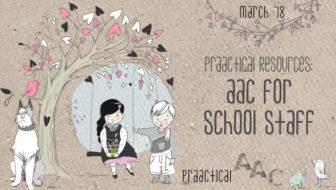
Looking for a learning resource that goes beyond a quick overview and covers some of the details about providing AAC to school-aged children? Today, we visit an online learning site by the UK Department for Education called Communication-Augmentative and Assistive Strategies. It has wonderful information on a variety of AAC topics and downloadable resources for topics such as low tech AAC, vocabulary selection, and becoming a good communication partner. Take your time to explore this learning module and all of the resources it has to offer.
Filed under: Featured Posts, PrAACtical Thinking
Tagged With: downloads, education, resources, school
March 27, 2018
by Carole Zangari -
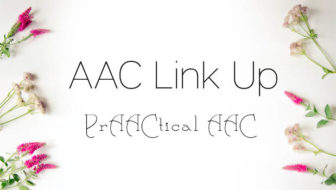
“The miracle is this: The more we share, the more we have.” (L. Nimoy) Each Tuesday, we invite you to share your own AAC-related goodness so that others may benefit from your efforts. It may be a recent post you’ve written, a slide deck from your AAC presentation, a handout, video, or meme that you’ve posted online, an AAC product you’ve created, an announcement for an AAC camp or conference, or any other prAACtical content you developed and want to share with the AAC community. To post your own link, scroll all the way down to the bottom of this post and complete the form. The AAC Link Up is moderated to keep us from being spammed, so it may take a little while for your link to show up. Note: If you receive this post in your email inbox, you are probably getting it before anyone has had a chance to... [Read More...]
Filed under: PrAACtical Thinking
Tagged With: AAC Link Up
March 26, 2018
by Carole Zangari -
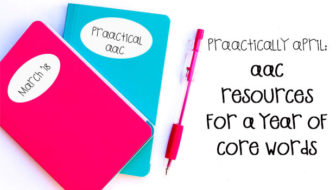
It’s almost time to turn the calendar to a new page and that gives us the opportunity to highlight a new set of core words. Whether you are following along with the Set 1 (12 words/month) or the Set 2 words (16 words/month; Different than the previous core words), or are just getting started, this post has some helpful resources. We’re grateful to Nancy Inman, Brian Whitmer, Tina Lombardi, Barbara Fernandes, Russell Cross, Gail Van Tatenhove, Allison Wade, Eric Sailers, Bill and Lori Binko, Heidi LoStracco, Rachael Langley, and all the others who have contributed to this effort. Our words for this month are as follows. Set 1 List: big, busy, do, drink, feel, he, in, make, out, some, tell, who Set 2 List: blue, brother, close, family, head, last, long, no, old, right, scared, soft, thing, top, wash, whole Here are some resources to help with implementation. Templates for you to plug... [Read More...]
Filed under: Featured Posts, PrAACtical Thinking
Tagged With: A Year of Core Words
March 25, 2018
by Carole Zangari -
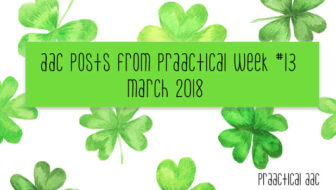
Missed some of our AAC posts from last week? Here’s what we were up to. Monday – PrAACtical Resources: Pragmatic Profile for People Who Use AAC Tuesday – AAC Link Up Wednesday – Video of the Week: Feature Matching for Apps Thursday – PrAACtical Alert: AAC App Discounts :::::::::::::::::::::::::::::::::::::::::::::::::::::::: Looking for some resources to use in your AAC work? Check out some of those listed below. AAC 101 Flipbook Communication Partner Data Collection Form AAC Skills: Caught or Taught? AAC Modeling Handout Repairing Communication Breakdowns
Filed under: PrAACtical Thinking
Tagged With: AAC modeling, communication repair, flipbook, partner skills, summary post
March 22, 2018
by Carole Zangari -
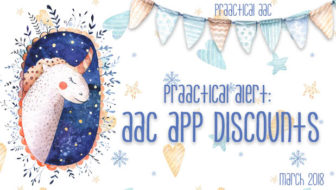
Lauren Enders does it again! We can always count on her for up-to-date information on the sales and discounts that get offered for Autism Awareness and Acceptance Month (April) and AAC Awareness Month (October). Check out this useful information. Note: The resources in this post will be updated with new information as it becomes available. Thank you, Lauren! ::::::::::::::::::::::::::::::::::::::::::::::::::::::: Looking to purchase an AAC or literacy app? It’s that time of year again! Don’t miss your chance to download select apps at a substantial discount in honor of Autism Acceptance/Awareness month. (Not all developers will be offering discounts.) Make sure you note specific sale dates for each app as they vary. Link to a PDF of this graphic for sharing: http://bit.ly/aacappsalegraphicmarchapril18 You can view or download a spreadsheet with sale dates and download links here http://bit.ly/aacappsalesmarchapril18 Reminder from my friend and respected colleague Rachael Langley: “Remember many of these programs... [Read More...]
Filed under: Featured Posts, PrAACtical Thinking
Tagged With: AAC apps
March 19, 2018
by Carole Zangari -
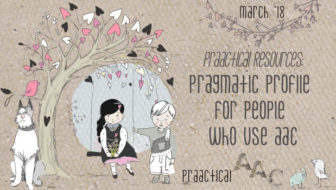
We’ve shared the Pragmatics Profile of Everyday Communication Skills in Children (by Hazel Dewart and Susie Summers) previously, and it remains a very useful tool. More recently, it has been adapted by Suzanne Martin, Katherine Small, and Rachel Stevens to focus specifically on people who use AAC. The Pragmatic Profile for People Who Use AAC is a welcome addition to our AAC assessment toolkit. Many thanks to the ACE Centre for their leadership and support in this area. :::::::::::::::::::::::::::::::::::::::::::::::::::::::::::::::::::::::::
Filed under: Featured Posts, PrAACtical Thinking
Tagged With: ACE Centre, assessment, pragmatics
March 15, 2018
by Carole Zangari -
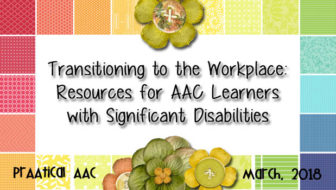
If we do our jobs well, students with AAC needs will leave school with a solid plan for post-secondary learning and/or the workplace. In most places, it can be challenging to identify meaningful work and learning experiences for young adults with AAC needs as they exit public education. While employment and educational opportunities for these young adults are slowly increasing, it is nonetheless a struggle to help young adults get prepared for their post-school lives. In this post, we share some resources that can help teams guide students and their families. QuickBook Of Transition Assessments (Cline, Halverson, Petersen, & Rohrbach, 2005) Reading-Free Vocational Interest Inventory–Second Edition (R-FVII:2) (Becker, 2000) Choose and Take Action Vocational Assessment Software (Martin, Marshall, Wray, Wells, O’Brien, Olvey, & Johnson, 2004) Self-Directed Employment: A Handbook for Transition Teachers and Employment Specialists, (Martin, Mithaug, Oliphint, Husch, & Frazier, 2002): May be out of print but available in... [Read More...]
Filed under: Featured Posts, PrAACtical Thinking
Tagged With: transition, vocational planniing, work
March 12, 2018
by Carole Zangari -
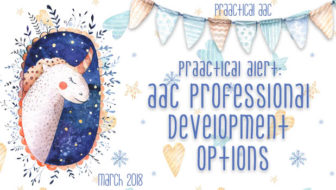
Lauren Enders, an amazing AAC SLP from Pennsylvania, graciously shared this list of professional development opportunities that may be of interest. Lauren works as an Augmentative Communication/Assistive Technology Consultant for Bucks County Intermediate Unit #22. In the list below, she shares resources for AAC learning in both online and face-to-face formats. Enjoy! You can see more of Lauren’s guest posts here. PROFESSIONAL DEVELOPMENT OPTIONS FOR AAC IMPLEMENTATION ONLINE SELF-DIRECTED LEARNING OPTIONS: Power AAC modules: a FREE training series developed by The Pennsylvania Training and Technical Assistance Network (PaTTAN)with Gail Van Tatenhove, CCC-SLP. This series of brief modules can be used for professional development by individuals or groups who are supporting students with complex communication needs and who need or use AAC. The POWER AAC modules are intended to build the capacity of school personnel to improve communication skills and provide flexible, generative vocabulary for students who need or use AAC. AAC Institute... [Read More...]
Filed under: Featured Posts, PrAACtical Thinking
Tagged With: Lauren Enders, lifelong learning, professional development
March 8, 2018
by Carole Zangari -
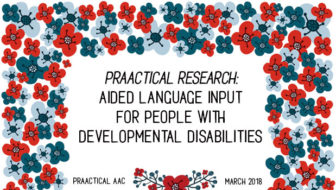
We’re pleased to welcome back Dr. Kathy Howery for another analysis of an AAC research article. Kathy is based in Alberta, Canada, and has worked in the field of AT and special education for over three decades. In the past year, she completed her doctoral studies where she used phenomenological methods to seek to understand the lived experience of speaking with/through a speech generating device. Kathy is currently working as a consultant to schools and school districts across Alberta focusing primarily on children and youth with complex communication needs. ::::::::::::::::::::::::::::::::::::::::::::::::::::::; Allen, A. A., Schlosser, R. W., Brock, K. L., & Shane, H. C. (2017). The effectiveness of aided augmented input techniques for persons with developmental disabilities: A systematic review. Augmentative and Alternative Communication, 33, 149-159. What this Article is All About (The Focus of the Research) This article presents the results of a systematic review of the research into what the authors refer... [Read More...]
Filed under: Featured Posts, PrAACtical Thinking
Tagged With: aided language input, augmented input, Kathy Howery, research
March 5, 2018
by Carole Zangari -
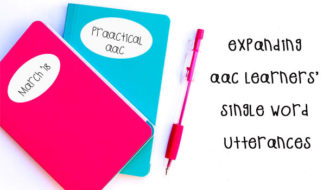
Know any learners like these? Jacob takes his teacher over to the snack cupboard and uses his SGD to say ‘cracker.’ Mara watches her friend throw a book and signs ‘angry.’ Elisheva finishes her drink and uses a communication book to say ‘more’ Some AAC learners linger at the single word level for far longer than they need to. One of the strategies that we use to help them move forward is to expand on their utterance and build on their word to model a 2-word sentence. ‘Cracker’ becomes ‘Want cracker.’ ‘Angry’ is built into ‘Shoshana’s angry.’ ‘More’ turns into ‘more milk.’ Sounds simple, right? Well, the concept certainly is, but it’s easy to get stuck or draw a blank when trying to do these sorts of expansions in therapy sessions, classroom activities, or daily routines. If you find your team forgetting to expand the learners’ single word utterances, some examples... [Read More...]
Filed under: Featured Posts, PrAACtical Thinking
Tagged With: expansions, language intervention









